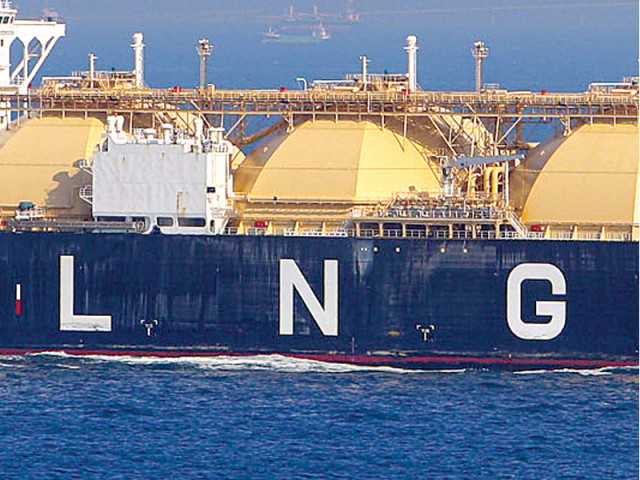PM body rejects LNG price study
Refers matter to regulator for review as study proposes price cut of only 2 cents

A high-level committee, led by Deputy Prime Minister Ishaq Dar, has expressed serious concern over a study on reducing liquefied natural gas (LNG) import charges and has directed the regulator to review the proposal.
Sources told The Express Tribune that the committee on gas sector, formed by Prime Minister Shehbaz Sharif, had been informed earlier that the government could reduce LNG charges up to $1.5 per million British thermal units (mmBtu) by reviewing different expenditure categories.
The Port Qasim Authority had assigned the task of conducting the study on LNG pricing to a third party. The study was submitted in a recent meeting of the committee.
It proposed that the LNG price could only be reduced by two cents per mmBtu, which sparked concern among committee members. They called it a flawed document and referred the matter to the Oil and Gas Regulatory Authority (Ogra) for review.
At present, LNG buyers are paying port terminal charges, retention charges and the cost of high unaccounted-for-gas (UFG) losses.
Sources pointed out that there were different UFG rates for transmission and distribution pipelines. However, LNG was not being sold through the transmission lines and most of the gas was being provided via the distribution lines, which resulted in higher UFG charges for consumers. They revealed that the LNG buyers had asked for removing the retention charges and applying a uniform UFG rate for the transmission and distribution lines, which would result in price reduction.
Bidding for offshore, onshore blocks
During the meeting, according to sources, Oil and Gas Development Company (OGDC) Managing Director Ahmed Hayat Lak and Mari Petroleum MD appreciated the committee for resolving the issue of selling gas to a third party. It would improve cash flow of the companies, they said.
Earlier, gas exploration firms were encountering cash flow problem due to the accumulation of circular debt. The approval for selling 35% of discovered gas to the third party will help them cope with the circular debt.
Moreover, the improvement in cash flow will enable the exploration companies to ramp up work on the ongoing and new projects to make the country self-sufficient in oil and gas production.
Sources said that the committee also decided to float tenders for the auction of new onshore blocks by April 30. In the meantime, the government is working to issue tenders for offshore exploration blocks.
The committee directed the Petroleum Division to float tenders for offshore blocks by June 30.
Earlier, US energy giant ExxonMobil participated in offshore drilling in Karachi but it did not yield desired results. Now, the government hopes that Russian firms will also take part in bidding for offshore blocks.
Speaking to meeting participants, Deputy PM Ishaq Dar underscored the government's commitment to creating a secure and investment-friendly environment for the exploration and production (E&P) sector. He emphasised the need for developing a comprehensive strategy to tackle the circular debt and introduce sustainable gas pricing mechanisms to enhance financial stability of the energy sector.
Federal Minister for Petroleum Ali Pervaiz Malik highlighted the steps taken to address challenges of the energy sector. He stressed that the government was focused on indigenisation and integrated energy planning.
The deputy PM appreciated the announcement of offshore and onshore bidding rounds, terming it a significant step towards unlocking Pakistan's hydrocarbon potential and attracting foreign and local investment.
He also welcomed the notification allowing E&P companies to sell 35% of gas to third parties and called it a key reform that would promote competition, improve payments and increase investment in exploration activities.
While discussing the security issues faced by E&P companies, the committee commended the support of the Pakistan Army, Ministry of Interior and law enforcement agencies (LEAs) for ensuring a stable operating environment. It was acknowledged that the completion and connection of the Shewa discovery in Waziristan to the Sui Northern Gas Pipelines Limited's (SNGPL) network would not have been possible without their support.
Discussions also covered long-term energy planning, with a focus on optimising domestic resources to reduce reliance on imports. The meeting reviewed LNG procurement and supply chain challenges, aiming to ensure uninterrupted gas availability to industries and consumers.
The deputy PM reaffirmed the government's resolve to implement reforms, expedite regulatory approvals, and facilitate private sector participation in the energy sector. He directed relevant authorities to take immediate steps to address the identified challenges and strengthen Pakistan's energy security.
"The government remains committed to fostering a robust E&P sector, ensuring sustainable energy development, and driving economic growth," the meeting was told.




















COMMENTS
Comments are moderated and generally will be posted if they are on-topic and not abusive.
For more information, please see our Comments FAQ